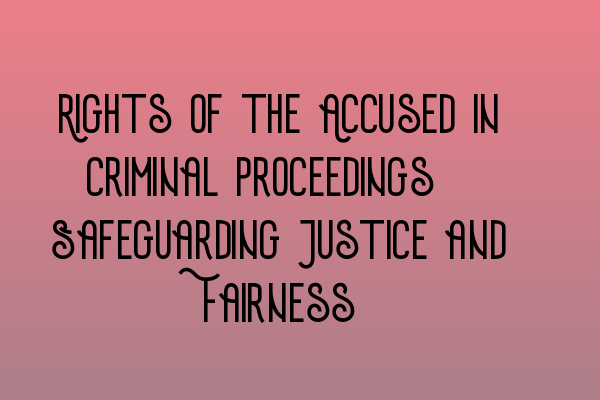Rights of the Accused in Criminal Proceedings: Safeguarding Justice and Fairness
When it comes to criminal proceedings, it is crucial to ensure that the rights of the accused are protected. Safeguarding justice and fairness is the cornerstone of a just legal system. In this blog post, we will explore the essential rights that every accused person is entitled to during criminal proceedings.
The Right to Legal Representation
One of the fundamental rights of the accused is the right to legal representation. It is crucial for every accused person to have access to qualified legal counsel who can provide effective representation and ensure a fair trial. The importance of legal representation in criminal cases cannot be overstated.
If you are prepping for the SQE exams, it’s crucial to understand the significance of legal representation in criminal proceedings. Make sure to check out our SQE 1 Preparation Courses and SQE 2 Preparation Courses for comprehensive guidance on criminal law and practice.
The Right to a Presumption of Innocence
Another fundamental right of the accused is the right to a presumption of innocence. Every person charged with a criminal offense is considered innocent until proven guilty beyond a reasonable doubt. This principle lies at the heart of criminal justice, ensuring fairness and protecting individuals from unjust convictions.
The Right to a Fair and Public Trial
The right to a fair and public trial is an indispensable element of the criminal justice system. A fair trial guarantees that the accused has the opportunity to present their case, challenge the evidence against them, and be heard by an impartial judge or jury. Transparency is vital to maintaining public confidence in the justice system.
For aspiring lawyers preparing for the SQE exams, it is crucial to have a thorough understanding of the principles governing fair trials. To test your knowledge, take a look at our SQE 1 Practice Exam Questions and SQE 1 Practice Mocks FLK1 FLK2.
The Right to Confront and Cross-Examine Witnesses
In criminal proceedings, the accused has the right to confront and cross-examine witnesses brought against them. This right ensures that the evidence presented is tested and scrutinized, allowing the accused to challenge any inconsistencies or inaccuracies in the testimony.
The Right to Remain Silent
The right to remain silent is a crucial protection afforded to the accused. It allows individuals to avoid self-incrimination and ensures that no adverse inferences are drawn from their silence. This right is supported by the principle that the burden of proving guilt rests solely on the prosecution.
The Right to a Speedy Trial
The right to a speedy trial is essential in maintaining the integrity of the criminal justice system. It ensures that accused individuals are not subject to unnecessary delays, protecting their right to a fair and expeditious resolution of their case.
The Right to Appropriate Disclosure of Evidence
Accused persons have the right to be provided with all relevant evidence held by the prosecution. This includes both inculpatory and exculpatory evidence. The proper disclosure of evidence allows the accused to prepare a strong defense and prevents any surprises or unfair advantages for the prosecution.
Keeping up with the latest updates and exam dates for the SRA SQE exams is crucial for aspiring criminal lawyers. Don’t miss out on SRA SQE Exam Dates and ensure you are well-prepared for the exams.
In Conclusion
The rights of the accused in criminal proceedings are paramount to safeguard justice and fairness. Legal representation, the presumption of innocence, fair trial rights, the right to confront witnesses, the right to remain silent, the right to a speedy trial, and appropriate disclosure of evidence are all fundamental rights that must be upheld.
Aspiring lawyers preparing for the SQE exams should dive deep into these rights and fully understand their significance in criminal law and practice. For comprehensive study materials, check out our SQE 1 and SQE 2 preparation courses.
